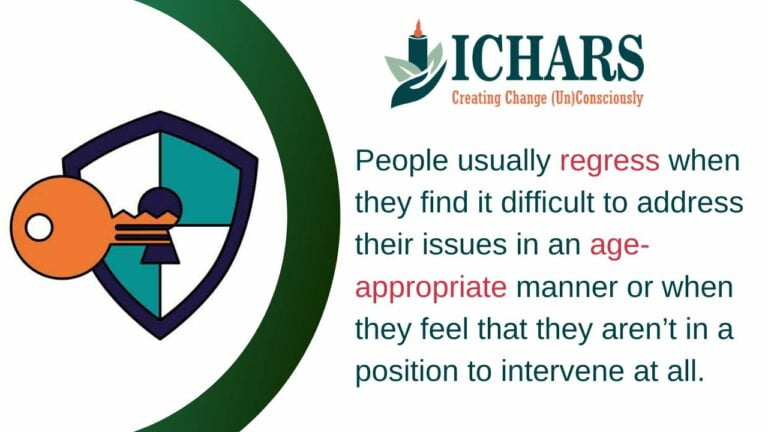Defense Mechanism of Regression: Case Study

11-years-old Raj had to relocate with his parents as his father received a job transfer. Distressed yet not in a position to oppose this happening, he dejectedly left behind his school and friends.
Waking up with great reluctance on the first day of his new school, he finds himself wet in his bed.
After quite a few repeated occurrences of the same incident, the parents got highly worried about their child’s well being, for they were completely unaware of the turmoil he was undergoing and in a way, so was he.
Any therapist would claim that the little boy was regressing.
What is the defense mechanism of Regression?
Regression as a defense mechanism refers to unconsciously reverting back (in terms of thoughts, feelings, behaviours….) to an earlier stage of development.
It is a defense mechanism that is used to deal with the current stressors of our lives.
People usually regress when they find it difficult to address their issues in an age-appropriate manner or when they feel that they aren’t in a position to intervene at all.
As in the case of Raj! Raj, a middle school-age child, started wetting his bed like an infant who hasn’t received any toilet training because he couldn’t bear the anxiety caused by relocation and separation from his peers.
Another kind of regressive tendency often seen among children is thumb-sucking. Addressing the underlying unmet need in the child usually corrects the regressive behaviour.
However, children aren’t the only ones susceptible to such behaviours.
Regression in Adults: Case Study

Raj grows up to be a typical 20-year-old who wishes to study abroad. He makes it to his desired college and begins a new life in a new apartment with new people to reside with.
However, he finds it difficult to sleep at night and soon shoots off an email to his parents requesting to send his childhood Teddy.
Highly amused by this request, his parents choose to comply. Raj starts sleeping well cuddling with his Teddy.
Regression often helps to meet short term benefits, e.g., sleep as in the case of our young man here. He copes with the apparent insecurity of his new lifestyle by extracting some sense of protection from his childhood source of safety: his Teddy.
However, a problem arises when we become dependent on such defense mechanisms and refuse to learn from our new experiences.
So instead of adapting to his new friends and environment by socializing and knowing his way around, if Raj decides to meet his security needs by reverting to an early psychological stage (sleeping with his Teddy) that provides immediate soothing, Raj is exhibiting the defense mechanism of regression.
Usually, the mindset behind such exhibits is to unconsciously receive the nurturance and reassurance provided by an adult authority figure that took care of all your hardships faced in childhood.
Now Raj, a 35-year-old, takes up a job and lives with his wife. His boss, an old yet sharp man with greying hair, usually criticizes his work and never shows a sense of appreciation.
Unable to take this daily dose of censure and the following pen-chewing sessions anymore, Raj goes back home, curls into a ball of mess and starts crying—rocking back and forth as a baby cradled in his mother’s arms.
Does his crying like that seem out of the ordinary?
Indeed it does!
That is because our fully grown adult version of Raj is yet again regressing.
Regression takes place among adults facing unresolved frustration.
Resorting to such behaviours as pen chewing is indicative of ‘fixation’ that occurs at a particular point in childhood where our desires have not been gratified or maybe in some cases- over gratified. These disturbances in the normal course of development, in Freudian psychology, become your safe haven to which you return every time you find yourself in a position where you feel like “I can’t take it anymore.”
Each time we feel like we’re in a pickle, we feel helpless. Helplessness is a predominant feeling experienced in the early years of life because of our great dependency on our caretakers for almost everything. Hence, under duress we find ourselves seeking comfort from childlike behaviours that provided us relief back then.
Defense Mechanism of Regression: Purpose and Problem
Remember, the Defense Mechanism of Regression is happening at the level of the unconscious to protect the client by helping them express the feelings (in a childlike manner) that they were otherwise not able to express in a mature adultlike manner. Though the client is able to express these feelings, regressive childlike ways don’t really help them in resolving the conflict.
Therapists Niche: Working with Defense Mechanism of Regression
- It is important to help clients build skills and mental states that are appropriate for the clients to be able to express these feelings in a more appropriate & effective manner that will help the client not only experience temporary relief but also leads to resolution of the conflict that lead to these feelings.
- In order to understand the client’s behaviour and the reasons behind it, the therapist can use Erick Erickson’s “stages of development model” which attempts to explain why a person regresses to a particular age group when experiencing certain emotions and situations.
- Help the client move beyond the defense mechanism of regression through creating awareness, developing skills, releasing suppressed emotions & accessing empowering mental states.
- You can use a combination of conscious intervention & planning through effective questioning (checkout Meta Model), T.O.T.E, Corrective therapy, SVIT™ for creating awareness.
- SOFT SEA™ can be used to help clients identify and develop required skills.
- Hypnotherapy techniques like Regression Therapy or Inner Child Therapy can be used for releasing suppressed emotions.
- Anchoring, Hypnotic Suggestions and mental rehearsals / future pacing can be used help the client access empowering mental states.
- Through this combination of techniques, the client is encouraged to acknowledge his problem, identify its cause, come up with a solution & apply this solution to achieve the desired outcome. In essence, it is a person-centred approach that also helps develop resilience and adaptive strengths in the client.
Precautions to take when working with Regression
However, while using Regression and Psychoanalysis, a therapist needs to be careful about the choice of words. Asking closed-ended questions could lead to the creation of false memories which can create further complications. So, it is important to ask open-ended questions during these processes so that the client can understand his or her own subjective experiences and is not influenced by any choices provided by the therapist.
If you are a psychologist or a psychology student, and would like to learn powerful therapeutic techniques like Regression, Inner Child work among others, do join us for our practitioner course Cognitive Hypnotic Psychotherapy™ to master these techniques which will help you become a more effective and successful therapist.

